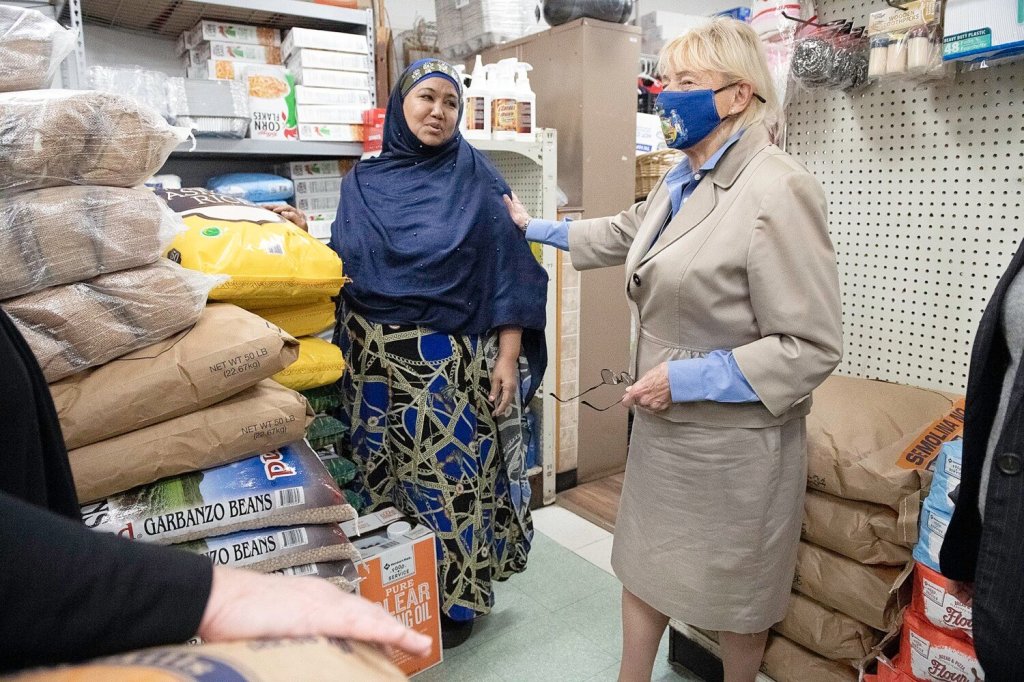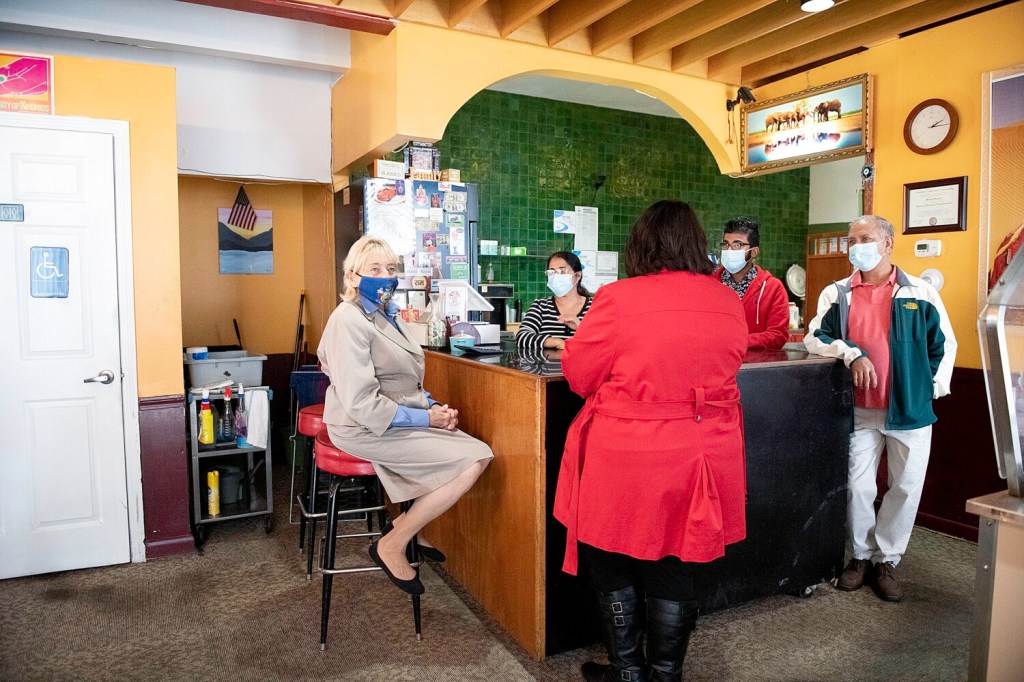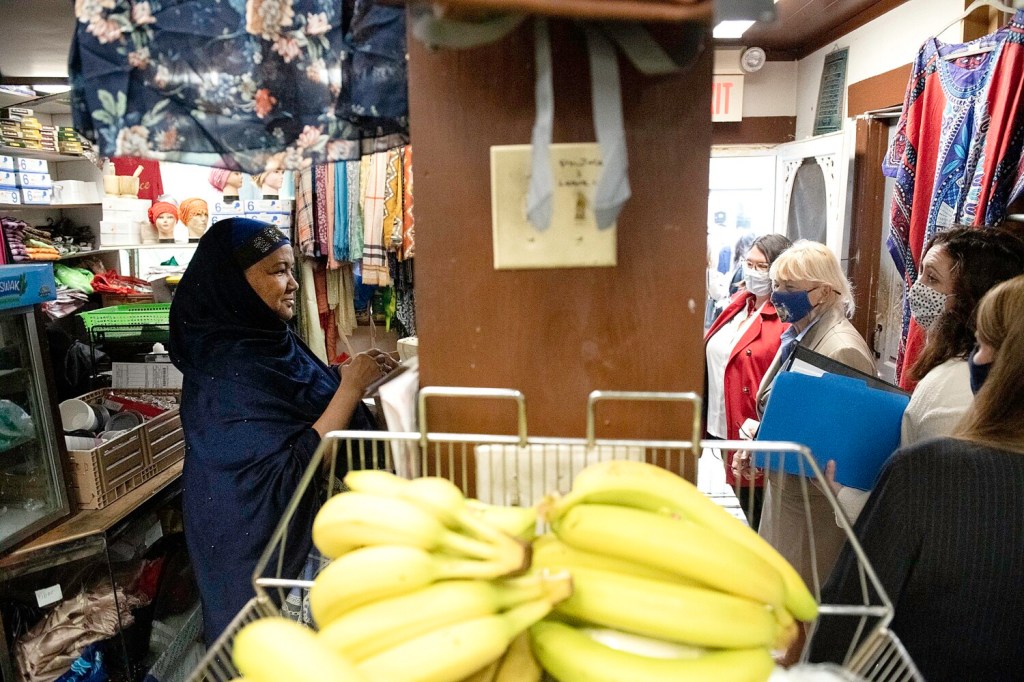LEWISTON — Standing in front of DaVinci’s Eatery on Monday, Gov. Janet Mills announced programs for up to $100,000 grants for small businesses with pandemic debt, temporary health insurance premium help for those with under 51 employees and a payment meant to stabilize unemployment insurance rates, part of the nearly $1 billion Maine Jobs & Recovery Plan.
“Today is Day One of these investments, the day this takes effect, and I can tell you this: Maine people are ready,” Mills said. “We’ve beaten back the pandemic better than most all other states and we’re on the path to recovery, but we’ve got work to do and everybody knows it.”
The Legislature passed the recovery plan, which uses federal American Rescue Plan Act funds, last summer.
Announced on Monday were:
• $20 million for the Small Business Grant Program with $5 million available starting Nov. 1 and $15 million available next April.
In the first rollout, Maine Department of Economic and Community Development grants will target businesses and nonprofits with 250 employees or less that can show a 20% financial loss in 2021 and took out loans to sustain operations.
• $39 million for the Small Business Health Insurance Premium Relief Program to offset health insurance premiums from November 2021 to April 2023 at a rate of between $50 to $130 per employee per month.
Employers in qualifying small group plans will be automatically enrolled and have to share savings with the employee if an employee pays part of their coverage.
• $80 million to replenish the Maine Unemployment Trust Fund that roughly 45,000 Maine businesses pay into.
The Maine Department of Labor has paid out more than $2.4 billion in unemployment benefits since March 2020, a mix of state and federal funds.
Shanna Cox, president and CEO of the Lewiston Auburn Metropolitan Chamber of Commerce, who joined the governor on a downtown walking tour after the announcement, said the measures were all “crucial for some amount of predictability for businesses as they plan their own recovery.”
“At a time when often people are looking at health care costs as one expense and employers are looking at key benefits to attract and retain employees, that’ll be a key piece,” she said. “We’re excited that these are the first steps and we’re excited to see the rest of the plan’s expenditures in the coming weeks.”
Dana Connors, president and CEO of the Maine State Chamber of Commerce, said all three “strike to the very heart of the challenges that the pandemic has had on the small business community in the state.”
For the unemployment funds specifically, “think of the alternative,” Connors said. “Without this $80 million investment, we could be looking at increases in the unemployment tax of nearly 60%.”
Mills said she hoped the health insurance premium help could “lighten the load for businesses.” It starts at $50 for a single employee and ranges up to $130 for a plan with two adults and one child.
Some details were still to come about specifics of both the November and April grant funds.
Department of Economic and Community Development Commissioner Heather Johnson said that while the grants weren’t limited to particular industries, her office was seeing more need in some specific areas, such as motor coach companies that rely on cruise ship traffic or dry cleaners, who “depend upon people being in offices and people being more formal.”
“It’s an interesting set of sectors we’re seeing really struggle and we want to make sure we put together a set of metrics for them that . . . meet that targeted need,” she said.
Mills said she chose Lewiston for her Day One announcement because of her longtime ties to the area, working here as district attorney for 15 years, meeting and marrying her late husband here.
“Right here at DaVinci’s, a staple of this community for 25 years, they had to close one day a week because of the lack of staff —it’s heartbreaking for all of us,” she said. “We’re ready to tackle the economic challenges immediately in front of us and tackle the long-standing challenges like workforce shortage that has constrained our ability to grow and thrive for many years.”
Jules Patry, owner of DaVinci’s, said he wasn’t sure if the health care premium help or grants would apply to his restaurant, but “I think it’s important that during these times when the ability to do business is affected, that there are programs to help us through it.”
Lincoln Jeffers, Lewiston’s economic and community development director, also joined the post-announcement walking tour, which had stops at Museum L-A and a few downtown businesses.
“It’s great to see the money going out there doing the work it needs to be doing,” he said. “Maine’s excelled at not just talking about things but actually moving the ball forward.”
Send questions/comments to the editors.








Success. Please wait for the page to reload. If the page does not reload within 5 seconds, please refresh the page.
Enter your email and password to access comments.
Hi, to comment on stories you must . This profile is in addition to your subscription and website login.
Already have a commenting profile? .
Invalid username/password.
Please check your email to confirm and complete your registration.
Only subscribers are eligible to post comments. Please subscribe or login first for digital access. Here’s why.
Use the form below to reset your password. When you've submitted your account email, we will send an email with a reset code.